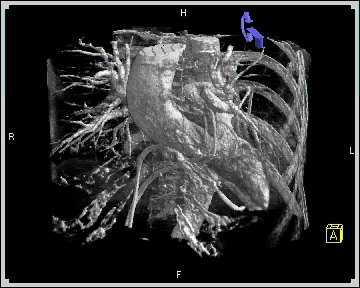
Friedrich-Alexander-Universität Erlangen
Lehrstuhl für Mustererkennung
Martensstraße 3
91058 Erlangen


Angiographic C-arm systems are the main imaging devices for guidance of catheter-based interventional procedures. In addition to conventional fluoroscopy, 3-D images can be generated using rotational angiography. In cardiology, 3-D reconstruction is challenging due to the heart motion which necessitates high temporal resolutions. These cannot readily be achieved with a C-arm computed tomography (CT) acquisition of a few seconds duration. Therefore, retrospective electrocardiography gating is applied to reconstruct 3-D images of different cardiac phases (4-D imaging). However, these images typically suffer from severe undersampling artifacts which render them unsuitable for clinical use.
In this project, we investigate two approaches to reduce such artifacts and substantially improve image quality: Motion compensation for analytic reconstruction based on filtered backprojection and spatio-temporal regularization within an algebraic reconstruction framework following the compressed sensing principle. Thereby, we intend to enable comprehensive analysis and visualization of cardiac motion during interventions in the “cath lab.”